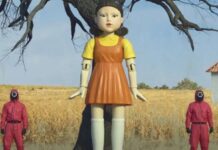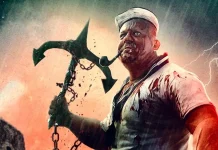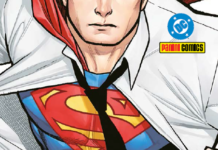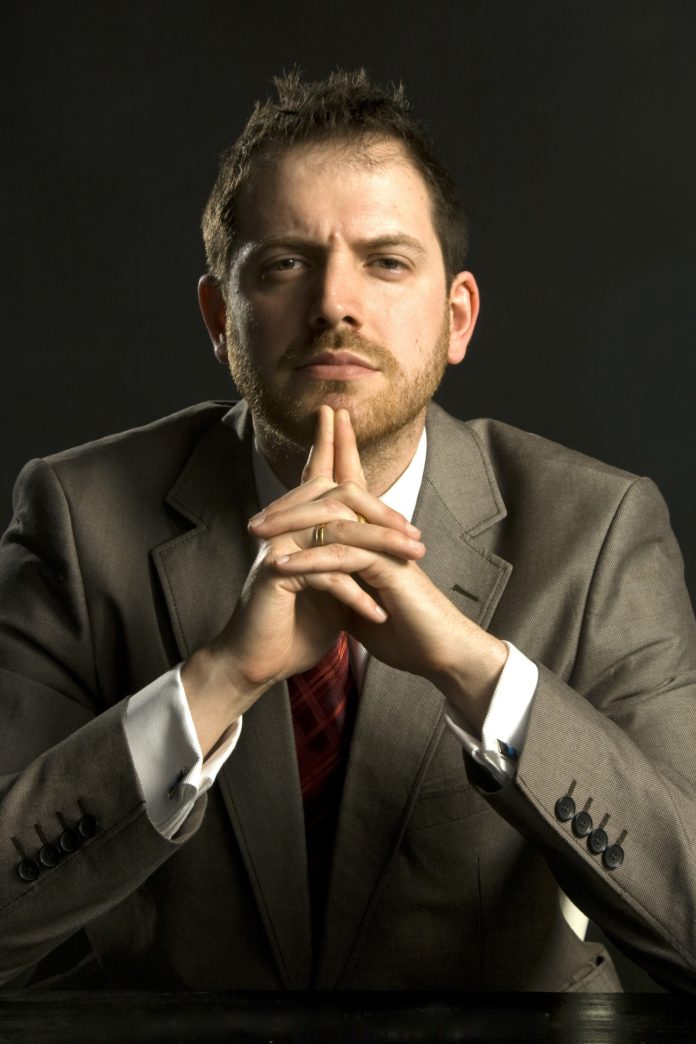Joe Abercrombie (Lancaster,1974) se ha pasado por Madrid y Barcelona para promocionar el lanzamiento de su nuevo libro, «Un poco de odio» (de la que os ofreceremos una reseña próximamente). Con esta novela, el autoproclamado Lord Grimdark inicia una nueva trilogía, conocida como La era de la locura, continuando y actualizando el Círculo del Mundo, la ambientación creada en su trilogía anterior, La primera ley. Un punto y seguido con un salto temporal de treinta años, introduciendo un mundo industrializado, al estilo de la Revolución Industrial, pero sin perder sus raíces de fantasía oscura. Gracias a su editorial en castellano, Lee Runas, hemos podido conversar con el autor. De sus respuestas queda claro que a Abercrombie le encanta lo que hace, siente pasión por mejorar aquellas novelas fantasía, llenas de personajes perfectos, que leía en su niñez. La visión grimdark del autor inglés lo ensucia todo, acercando el mundo tras las páginas a nuestro mundo real.
A continuación os dejamos con la traducción de la entrevista. Podéis encontrar la versión original en inglés después de la edición en castellano. / You can read the English version of this interview below the Spanish one.
¿Cómo ha sido la experiencia de volver al Círculo del Mundo tras unos años alejado del mismo?
Joe Abercrombie: Muy buena, la verdad, como volver a calzarte tu par de botas favorito. Cada libro tiene sus propios desafíos, sus obstáculos y momentos de duda, pero es increíble tener toda esa cantidad de escenarios, trasfondo y personajes a los que recurrir, incluso con la responsabilidad de mantenerlo todo en orden.
En “Un poco de odio” se presenta un nuevo plantel de personajes, ¿deberían considerarse una nueva generación, una nueva temporada utilizando términos televisivos o una evolución lógica, orgánica, de tu obra?
Joe Abercrombie: Supongo que cada uno de los libros independientes (“La mejor venganza”, “Tierras rojas” y “Los héroes”) tenían su propio reparto nuevo, aunque con algunas caras conocidas, así que enfoqué la situación de manera similar. En esta ocasión nos movemos toda una generación desde los hechos de La primera ley y nos desplazamos por las mismas localizaciones, así que la mayor parte del reparto principal son en realidad los descendientes o los protegidos de personajes que tan bien conocemos de libros anteriores. En La primera ley la mayor parte del reparto eran parias y canallas, en la Era de la locura hay mas personajes que actúan dentro de lo establecido, relacionados con sus familiares, amigos y la autoridad. Quizás puedas pensar en ella como La primera ley: La nueva generación.
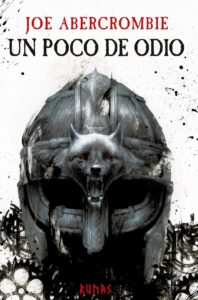
¿Cuál es tu personaje favorito o el que consideras que debe recibir una mayor atención de esta nueva hornada?¿Y de anteriores obras?
Joe Abercrombie: Creo que, para mi, esa es una pregunta imposible de responder. Los distintos personajes cumplen distintos propósitos y funcionan de distinta manera. Es como preguntarle a un carpintero cuál es su herramienta preferida. Las sierras están muy bien pero cuando quieres clavar un clavo, necesitas un martillo. Eso si, Nicomo Cosca es genial, eh. Y de esta nueva serie tengo debilidad por Isern-i-Phail. Me gustan los que me hacen reír.
Si quieres ver como un ejército pseudo-Napoleónico se enfrenta a los vikingos, puedes. Y, ¿quién no querría ver eso?
Has asumido el valiente reto de hacer avanzar tu creación, evitando quedar detenido en la época de La primera ley. Después de seis novelas y una colección de relatos, ¿considerabas agotada esa ambientación?¿Volverás a La primera ley o das por cerrado ese ciclo?
Joe Abercrombie: No soy necesariamente un tío de ambientaciones, estoy mas interesado en los personajes, las tramas… la acción y el drama, ya sabes. No veo el valor de destruir los escenarios solo por hacer unos nuevos. Tampoco creo que se agoten las historias dentro de un mundo inventado a mayor velocidad que en el mundo real. Y tenemos varios billones de historias desarrollándose en este mismo instante. Así que, si, puedo imaginarme de vuelta al mundo de La primera ley con el paso del tiempo, incluso si me centro en diferentes partes del mismo en tiempos distintos.
En relación con la pregunta anterior y debido al éxito de ese mundo, cercano a la fantasía oscura clásica y al habitual inmovilismo de cierta parte de las obras y fans del género, ¿has soportado muchas críticas por haberlo dejado atrás? ¿Te ha supuesto alguna duda interna o tenías el cambio asumido y planeado?
Joe Abercrombie: Cualquier libro que sea razonablemente leído no va a complacer a todo el mundo. Siempre intento probar y hacer cosas un poco diferentes en cada libro: puede ser un conjunto distinto de influencias, un periodo diferente o un conjunto distinto de personajes principales. Ahora mismo estoy muy orgulloso del hecho de que no exista un consenso real acerca de cuál es mi mejor libro, distintos lectores aprecian distintos elementos. Creo que, como autor, es bueno cribar las críticas en busca de cualquier cosa que creas que puede ser cierta, que te pueda ayudar a mejorar, pero también tienes que descartar mucho y seguir adelante, escribiendo acerca de aquello que te interese o te emocione. Para la gente es natural querer mas de todo aquello que les gusta, clamando por volver a ver viejos personajes. Es muy sencillo quedarse atascado en una repetición interminable de aquello que alguna vez tuvo éxito y convertirse en un mala copia de uno mismo. Quizá los lectores no se quejarían mucho pero irán, poco a poco, alejándose hacia autores mas emocionantes. Es una cosa que prefiero evitar…
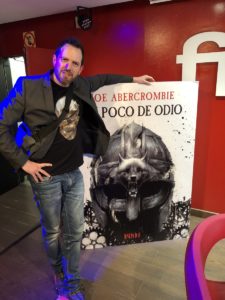
Los avances industriales marcan parte de la ambientación de “Un poco de odio”. ¿Ha costado concebir un mundo donde coinciden la industrialización y la magia sin perder coherencia?
Joe Abercrombie: Bueno, espero que no. Aunque, en la Era de la locura la magia esta retrocediendo y la industria, en auge. Tanto es así que los magos están pensando en la banca como la mejor forma de ejercer su influencia. El mejor aspecto de la fantasía es, por supuesto, que no tienes que imitar ningún periodo histórico del mundo real de forma precisa, puedes utilizar cualquier elemento que te inspire de cualquier periodo que te guste. Si quieres ver como un ejército pseudo-Napoleónico se enfrenta a los vikingos, puedes. Y, ¿quién no querría ver eso?
Una parte importante de “Un poco de odio” se centra en luchas obreras y desigualdades sociales. ¿Quizás sea reflejo de haber crecido en una época de revueltas obreras mineras, como fue la década de 1980 en Reino Unido, o surge como respuesta inmediata al capitalismo industrial?
Joe Abercrombie: Puede ser que haya un interés residual de la lucha de clases. Ahora mismo vivimos en una era de enorme desigualdad después de todo, pero una de las mejores cosas acerca de la revolución industrial es que hace surgir, de manera natural, todo tipo de conflictos y drama, quebrando a toda la sociedad. Ricos contra pobres, aristocracia contra nuevos ricos, conservadurismo contra progreso, intereses creados contra revolución. Nunca hubo un periodo, y quizás no lo ha habido desde entonces, con un cambio tan rápido, con tantos logros y fallos simultáneos, tanta riqueza inesperada y tanta miseria aplastante.
En La primera ley la mayor parte del reparto eran parias y canallas, en la Era de la locura hay mas personajes que actúan dentro de lo establecido.
Savine dan Glokta, Monza Murcatto y Espina Bathu son tres ejemplos de personajes femeninos poderosos en tu obra, que ganan mucho protagonismo en “Un poco de odio”. El mundo de la literatura fantástica, en general, no era demasiado respetuoso con la mujer, salvo excepciones, acotando roles tipo para los personajes femeninos, siempre vistos como objetos de violencia física o sexual, sanadoras o hechiceras, brujas malvadas, esposas sufridoras o guerreras masculinizadas vestidas con harapos como armaduras. ¿Cómo ves el panorama actual respecto a la fantasía y la mujer?¿Te supone un esfuerzo extra ponerte a trabajar en un personaje femenino?
Joe Abercrombie: Sabes que, honestamente, no leo mucha fantasía ahora mismo. Encuentro muy difícil apagar la parte crítica de mi cerebro y disfrutarla de la forma que lo solía hacer antes de escribirla yo mismo. Tiendo a leer otros géneros y también un montón de no ficción relacionado, generalmente, con lo que estoy escribiendo. Así que no voy a intentar comentar sobre la género fantástico en general. En lo que me concierne, con La primera ley escribí, pensando mucho sobre ello, un conjunto de libros muy masculino. En alguna ocasión se utiliza la expresión “fiesta de salchichas”, con cierta justificación. Estoy orgulloso de algunos de los personajes femeninos que hay en los libros pero son muy pocos. Mientras terminaba la trilogía sentía que había dejado pasar una oportunidad y que un reparto mas diverso podría haberlo acercado al mundo real, con una mayor variedad de personajes y relaciones. Y eso es la buena escritura, supongo. Desde entonces intento introducir mas personajes femeninos. Algunas veces son tías duras que quizás ocupan roles tradicionalmente masculinos. Pero en la Era de la locura creo que hay toda una gama de mujeres diferentes: inversoras, de alta sociedad, videntes, espías, trabajadoras industriales, revolucionarias, madres e hijas. Ese rango de mujeres ayuda a construir un tapiz del mundo más rico y variado para mi. No creo que sea ningún inconveniente.
La Trilogía del Mar Quebrado supuso tu acercamiento a la literatura para jóvenes adultos. ¿Tienes planeado volver a escribir para lectores jóvenes?
Joe Abercrombie: No tengo planes inmediatos pero no lo descarto. Intento no pensar en más de un proyecto a la vez. Tal vez no quede mucho..
Yarvi y Sand dan Glokta son dos personajes protagonistas con algún tipo de discapacidad, algo difícil de ver en mundos de fantasía. ¿Surgieron de manera natural, espontánea, o son reflejo de algún tipo de inquietud por favorecer la visibilidad de discapacidades?
Joe Abercrombie: La mayoría del reparto de La primera ley se desarrollaron durante muchos años pero Glokta vino a mi un día totalmente formado, de alguna manera. Apenas sé de dónde. Supongo que mucha de la fantasía que leía de pequeño presentaba a un montón de héroes perfectos, brillantes, que combatían la adversidad inmaculados y tan hermosos como siempre. Me gustan los personajes con oscuridad en su pasado. Gente que porta cicatrices por dentro y por fuera.
El término grimdark se ha dignificado gracias, en parte, a tu trabajo. ¿Cuál crees que es la siguiente meta o barrera que debe romper el género para mantenerse fresco?
Joe Abercrombie: ¡Ja! Mi último libro comienza con alguien que se caga encima y ¿crees que puedo dignificar algo? No creo que alguna vez me haya propuesto romper barreras o hacer algo abiertamente subversivo. Solo quiero escribir el tipo de libros que quería leer, algo entretenido que pueda sorprender al lector, que estuviese enfocado en las experiencias individuales de algunos personajes inusuales y vívidos. Cualquier renovación fue meramente accidental. Creo que es mas importante, probablemente, intentar escribir buenos libros que apuntar, de alguna manera, a hacer uno revolucionario. Quizás si terminas escribiendo bien puedes volverte revolucionario por accidente…
Me gustan los personajes con oscuridad en su pasado. Gente que porta cicatrices por dentro y por fuera.
En alguna entrevista anterior has comentado que “la buena fantasía es un espejo del mundo” (ABC, 21/5/2015). En este mundo real de fake news, coronavirus y brexit, ¿estamos viviendo en una realidad grimdark con algo menos de sangre y barro, sin la diversión de la magia y las espadas?
Joe Abercrombie: El mundo real tiene sus preocupaciones y desafíos, su mezquina maldad y avaricia pero también tiene un día a día lleno de esperanza y heroísmo. No hay que perder de vista esas cosas. Mis propios libros son cínicos en contraposición con la fantasía tan optimista que leía de niño, están creados para colocarse al otro lado de la balanza en vez de considerar que contienen todo lo que hay en la vida.
¿Qué personajes públicos reales ves capaces de sobrevivir en un entorno grimdark?¿Nos espera en una futura novela un nuevo salto de 30 años para ver un brexit en el Círculo del mundo? En la vida real, ¿eres cauto o derrotista con el brexit?
Joe Abercrombie: Sospecho que vivimos en un entorno bastante sombrío (grimdark), por lo menos en lo que concierne a la naturaleza de la política y el poder, así que imagino que es el mismo tipo de gente el que intenta llegar a lo mas alto. Ningún escritor es inmune a lo que sucede en el mundo que le rodea y en mi opinión, creo que la buena fantasía tiene algo que decir sobre el mundo moderno. La primera ley se centró mucho en la banca y la naturaleza del poder, la nueva trilogía vuelve su mirada hacia la desigualdad, el progreso, la revolución… y ahora mismo pienso que hay algunas referencias al brexit, también. Se llama la Era de la locura, en definitiva…
Recientemente has trabajado como asesor en la película “Terminator: Dark Fate” ¿Cómo ha sido la experiencia de trabajar para la industria del cine?
Joe Abercrombie: Ha sido muy divertido y un gran aprendizaje. Me senté en una habitación con algunos guionistas y directores a los que admiro y simplemente les lancé algunas ideas durante unos días. La satisfacción viene al ver un par de frases y conceptos míos llegar a la pantalla. De hecho, he perseguido algunas salas de guionistas en Hollywood alguna u otra vez…
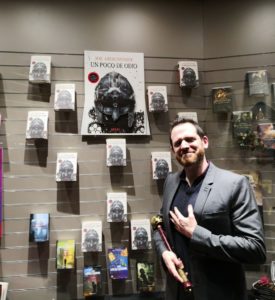
“Game of thrones”, “The witcher”, ahora tu colega Joe Hill con “NOS4A2” y “Locke & Key”… ¿cuándo podremos ver alguna adaptación de tu obra a las pantallas? #TossacointoyourAbercrombie
Joe Abercrombie: Algún día, espero. Pero no te hagas ilusiones.
“Un poco de odio”… ¿Hay algún colega de profesión al que odies por su talento?¿Alguna recomendación actual que consideres imprescindible?
Joe Abercrombie: Creo que es sano sentir un poco de envidia respecto al éxito de otros autores, te espolea para trabajar duro. Pero a la vez también admiras el oficio que demuestran otros escritores y das lo mejor para aprender de ello. Puede parecer que ser un autor es una cuestión vacía pero creo que los grandes escritores impulsan el género, llamando la atención sobre él y atrayendo lectores al resto de nosotros.
Madrid y Barcelona en febrero, la ya clásica visita a Avilés y su festival Celsius en julio… ¿Te sientes arropado en España? ¿Ya has pensado en mudarte definitivamente?
Joe Abercrombie: Siempre me he sentido muy bienvenido en España, en especial en Avilés. También se dice que la familiaridad engendra desprecio… ¿Quizás si me mudase ya no sería tan bien recibido?
How was the experience of returning to the Circle of the World after a few years away from it?
Largely good, yes, like slipping on a favourite pair of boots. Every book has its own challenges, its obstacles and moments of doubt, but it’s lovely to have all that mass of setting, background and characters to draw on, even if it can be a bit of a responsibility keeping everything straight.
In A Little Hatred a new set of characters is presented, should they be considered like a new generation, a “new season” (in TV show terminology) or simply a logical, organic evolution of your work?
I suppose each of the standalone books had its own new cast, albeit with some familiar faces in the background, so this is really just taking the same approach. This time around though, we’ve moved on a full generation from the First Law, and we’re returning to many of the same locations, so most of the central cast are actually the children, or the proteges, of characters we know very well from previous books. In the First Law much of the cast were outcasts and outsiders, in the Age of Madness they are very much insiders, with a lot of established relationships with parents, friends, authority. Perhaps you could think of it as First Law: The Next Generation.
What is your favorite character or the one you think should receive more attention in this new series? And from previous works?
For me I think it’s really an impossible question to answer. The different characters all serve different purposes and work in different ways. It’s like asking a carpenter what his favourite tool is. Saws are great but when you want to put a nail in you really need a hammer. Mind you Nicomo Cosca was pretty great, huh? And in this new series I do have a soft spot for Isern-i-Phail. I like the ones who can make me laugh.
You have assumed the courageous challenge of advancing your creation, not having stopped at the time of The First Law. ¿After six novels and a collection of stories, would you consider that setting to be spent? Do you plan on returning to The First Law or do you consider that cycle complete?
I’m not necessarily a setting guy – I’m more interested in characters, plots, action and drama, you know. So I don’t see the value in throwing the sets away just to make new ones. I don’t think you run out of stories in an invented world any more quickly than the real one. And we have several billion stories in progress here right now. So yes, I can imagine that I’ll always return to the world of the First Law down the years, even if I look at different parts of it at different times.
In relation to the previous question and due to the success of the world you created in that cycle, close to the classic dark fantasy and the usual conservatism of a certain part of the works and fans of the genre, have you endured many criticisms for having left it behind? Has this entailed any internal doubts in your mind about this change or was it something accepted and planned?
Any book that’s reasonably widely read isn’t going to please everyone. I always try and do something at least a little different with every book – whether it’s a different set of influences, a different period, a different set of central characters. I’m actually really proud of the fact that there’s no real consensus about what my best book is, different readers really do value different things. I think as an author it’s good to sift through criticism for anything that you think rings true, that can help you to improve, but you’ve also got to shrug a lot of it off and keep moving forward, and write about whatever interests or excites you. It’s natural for people to want more of something they loved in the past, to clamour to see old characters again maybe. But it’s easy to get stuck endlessly repeating something that was successful and become a bad pastiche of yourself. Maybe readers won’t complain so much, but they will just gradually wander off to more exciting authors. That’s something I’d rather avoid…
Industrial developments are included in the setting of A Little Hatred. Has it been difficult to conceive a world where industrialization and magic coincide without losing coherence?
Well, I certainly hope not. Though magic is very much in the retreat in the Age of Madness and industry very much on the rise. So much so that even the wizards are taking to banking as the best way to exert influence. The great thing about fantasy of course, is that you don’t have to precisely imitate some period of the real world, you can draw whatever inspires you from whatever period you like. If you want to see as pseudo-Napoleonic army facing off against Vikings, you can. And who doesn’t want to see that?
An important part of A Little Hatred focuses on class struggles and social inequalities. Could this be a reflection of the fact that you grew up in an era of mine workers revolts, such as the 1980s in the United Kingdom, or does it arise as spontaneous response to industrial capitalism?
It may be that there’s some residual interest in class struggle, and after all we live in an era of vast inequality right now, but one of the great things about an industrial revolution is that it naturally throws up all kinds of conflicts and drama, puts fault lines all through society. Rich against poor, aristocracy against new money, conservatism against progress, vested interests against revolution. There had never been a period, and maybe there hasn’t been since, of such rapid change, such simultaneous success and failure, sudden wealthy and crushing squalor.
Savine dan Glokta, Monza Murcatto and Espina Bathu are three examples of powerful female characters who gain a lot of protagonism in A Little Hatred. The world of fantasy literature, in general, has not been too respectful of women, with a few exceptions, establishing a set of limited type roles for female characters, always seen as objects of physical or sexual violence, healers or sorceresses, wicked witches, suffering wives or masculinized warriors dressed in rags as armor. How do you see the current scene regarding fantasy and women? Does it entail an extra effort for you to develop a female character?
You know I honestly don’t read a lot of fantasy these days – I just find it very difficult to switch off the critical part of my brain and enjoy it the way I used to before I wrote it myself. I tend to read in other genres, and a lot of non-fiction too, usually related to what I’m writing. So I wouldn’t presume to comment on the genre as a whole. As far as I’m concerned, with the First Law I wrote, really without thinking much about it, a very male set of books. The phrase ‘sausage fest’ has been used with some justification. I’m proud of some of the female characters in the books but there are very few. Even as I was finishing the trilogy I was feeling like I’d missed a trick, and a more varied cast could lead to a more real feeling world, with more variety of characters and relationships. And that’s just good writing, I guess. So ever since I’ve tried to bring more female characters in. Sometimes ass-kicking women that occupy classically male roles, perhaps. But in the Age of Madness I hope there’s quite a range of different women – investors, socialites, seers, spies, factory workers, revolutionaries, mothers and daughters. That range of female characters just helps to make the tapestry of the world feel richer and more varied for me. I don’t think there’s a downside.
The trilogy of the Shattered Sea was your approach to Young Adult fiction. Do you plan to continue writing for young readers.
No immediate plans to do another Young Adult book but I certainly wouldn’t rule it out. I tend to think no more than one project ahead. Maybe not even that far…
Yarvi and Sand dan Glokta are two main characters with some kind of disability, something very uncommon in fantasy literature. Did these character appear spontaneously on your mind or are they a reflection of your own interest in promoting the visibility of disabilities?
Most of the cast of the First Law developed over many years, but Glokta just came to me fully formed one day, somehow. I hardly know from where. I guess a lot of the fantasy I read as a kid featured a lot of shiny, perfect heroes who come through adversity unmarked and just as handsome as ever. I like some lived in characters with some darkness in their pasts. People who carry scars inside and out.
The concept of grimdark has been dignified, partly thanks to your work. What do you think is the next goal or barrier fantasy fiction must break to keep renewing itself?
Ha! My latest book starts with someone shitting themselves and you think I can dignify something? You know I don’t think I ever really set out to break down barriers or do something wildly subversive. I really just wanted to write the kind of book I wanted to read, something entertaining that could surprise the reader, that was really focussed on the individual experience of some unusual and vivid characters. Any renewal was strictly incidental. I think it’s probably more important to just try and write good books than to somehow aim at revolutionary ones. Maybe if you end up writing well enough you can become revolutionary by accident…
In a previous interview you commented that «good fantasy is a mirror of the world» (ABC, 5/21/2015). In this real world of fake news, coronavirus and Brexit, are we living in a grimdark reality with somewhat less blood and mud but without the fun of magic and swords?
The real world certainly has its worries and its challenges, its petty villanies and greed, but it’s full of hope and everyday heroism too. You don’t want to lose sight of those things. My own books are cynical really in reaction to the very optimistic fantasy I read as a kid – they’re meant to sit on the other side of the scales rather than sum up all that life is in themselves.
What current public figures do you see capable of surviving in a grimdark environment? Can we expect to see a new thirty year leap in a future novel to see some kind of Brexit in the Circle of the World? In «real» life, are you cautious or fatalistic about Brexit?
I suspect we live in a rather grimdark environment, at least as far as the nature of politics and power go, so I imagine the very same people would tend to rise to the top. No writer is immune from what’s going on in the world around them, and for myself I think the best fantasy has something to say about the modern world. The First Law had a lot to say about banking and the nature of power, the new trilogy looks at inequality, progress, revolution, and I actually think there’s a fair bit of comment on Brexit too. It’s called the Age of Madness after all…
You have recently worked as advisor in the movie Terminator: Dark Fate. How was the experience of working for the film industry?
It was huge fun and a great learning experience. I got to sit in a room with some writers and directors I hugely admire and basically throw ideas around for a few days, and then the ultimate satisfaction of seeing a couple of lines and concepts of mine make it to the screen. I’ve haunted a few writer’s rooms in Hollywood at one time or another, in fact…
Game of Thrones, The Witcher, now your colleague Joe Hill with NOS4A2 and «Locke & Key» … When can we see any adaptation of your work for the screen? #TossacointoyourAbercrombie
Some day, I hope. But don’t hold your breath.
A Little Hatred … Is there a colleague your hate for his talent? Any current work that you consider essential reading?
I think it’s only healthy to feel a little jealous of other writers’ successes – it’s a useful spur to make you work harder. But at the same time you admire the way other writers go about their craft, and do your best to learn from it. It might feel like being an author is a zero sum game, but I think great writers pushing the genre forward only helps to bring attention to it, and draw other readers to all of us.
Madrid and Barcelona in February, the classic visit to Aviles and its Celsius 232 festival in July … Do you feel welcome in Spain? Have you already thought about moving permanently?
I’ve always felt hugely welcome in Spain, especially in Aviles. But they do say that familiarity breeds contempt. Maybe if I moved in I’d no longer be so welcome…?


